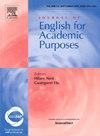Titles in archaeology research articles: a corpus-based comparison with other disciplines
IF 3.1
1区 文学
Q1 EDUCATION & EDUCATIONAL RESEARCH
引用次数: 0
Abstract
In comparison to other academic disciplines, the language of archaeology has received little attention from linguists. It is important to address this gap in our knowledge not only for its own sake, but also because archaeology today is a particularly heterogenous field, featuring contributions from disciplines across the soft and hard sciences. It is therefore of great interest to examine how the cooperation of experts from different traditions is reflected in the written discourse of its scholarly publications.
The characteristics of archaeology research article (RA) titles are analysed using a corpus of 845 samples from twelve journals. The design of the corpus allows its characteristics to be compared with data reported for six other fields in the soft and hard sciences. The archaeology RA titles are analysed and compared with these disciplines in terms of length, mood, syntax and structure. The sample data features a wealth of rhetorical devices and especially wordplay, at frequencies that are statistically significant when compared with other fields.
The findings suggest that in general Archaeology RA titles are similar to those of the soft sciences. However, RA titles in some archaeology journals with high hard science content show influence from the conventions of these disciplines.
考古学研究论文标题:基于语料库的与其他学科的比较
与其他学科相比,考古学的语言很少受到语言学家的关注。解决我们知识上的这一差距非常重要,不仅是为了它本身,也是因为今天的考古学是一个特别异质的领域,以软科学和硬科学各学科的贡献为特色。因此,研究来自不同传统的专家的合作如何反映在其学术出版物的书面论述中是非常有趣的。利用12种期刊的845个样本语料库,分析了考古学研究论文标题的特征。语料库的设计允许将其特征与其他六个软科学和硬科学领域的数据报告进行比较。从篇幅、语气、句法、结构等方面对考古类RA标题与这些学科的RA标题进行了分析比较。样本数据具有丰富的修辞手段,特别是文字游戏,其频率与其他领域相比具有统计学意义。研究结果表明,一般来说,考古学RA的头衔与软科学的头衔相似。然而,在一些硬科学含量较高的考古期刊中,RA标题受到了这些学科惯例的影响。
本文章由计算机程序翻译,如有差异,请以英文原文为准。
求助全文
约1分钟内获得全文
求助全文
来源期刊

Journal of English for Academic Purposes
Multiple-
CiteScore
6.60
自引率
13.30%
发文量
81
审稿时长
57 days
期刊介绍:
The Journal of English for Academic Purposes provides a forum for the dissemination of information and views which enables practitioners of and researchers in EAP to keep current with developments in their field and to contribute to its continued updating. JEAP publishes articles, book reviews, conference reports, and academic exchanges in the linguistic, sociolinguistic and psycholinguistic description of English as it occurs in the contexts of academic study and scholarly exchange itself.
 求助内容:
求助内容: 应助结果提醒方式:
应助结果提醒方式:


